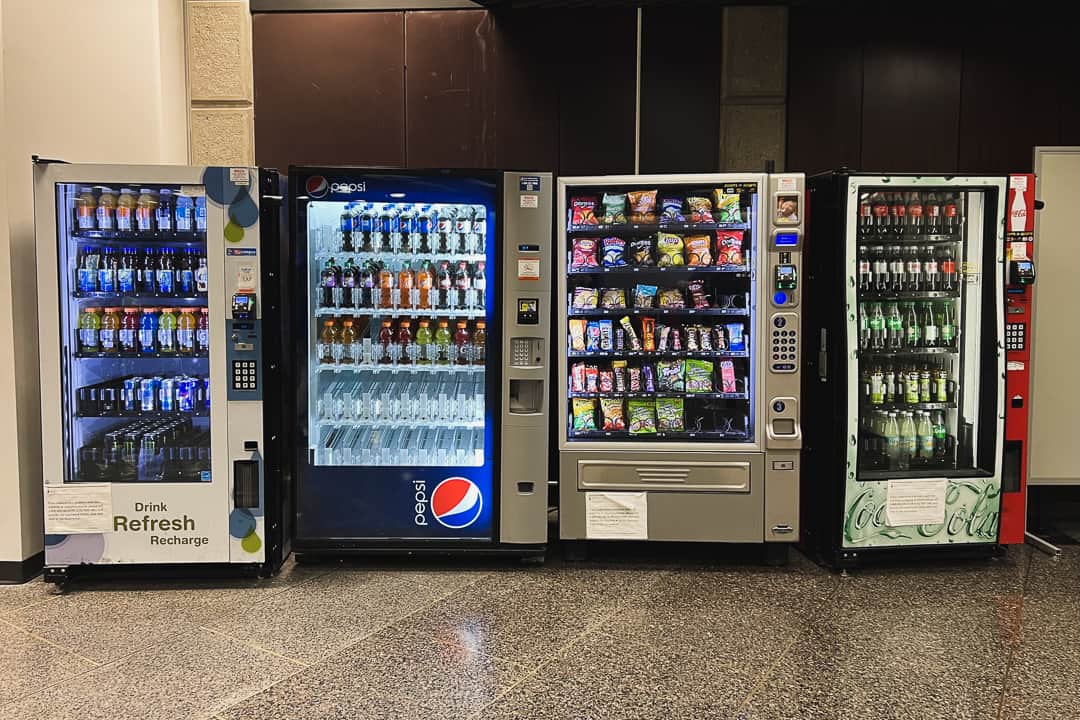John P. Robarts Library, the arguably-turkey-resembling building where I have spent the majority of my on-campus time at the University of Toronto, has a major problem. No, I’m not referring to the accessibility issues, nor the MAT137 students who frequent it, nor student-led responses, but the accessibility of beverages that are both healthy and reasonably priced.
Taking a close look at the fridges within the cafeteria and the vending machines lining the dining area, students might notice one thing missing — water! Now, we can all applaud the fact that for over a decade now, the university has stopped selling plastic-bottled water across all three campuses.
However, students who don’t have, or forget, their bottles — like myself! — are often forced to wait 20 minutes in the Starbucks line for a — plastic! — cup of water or are relegated to drinking the cheapest option in the vending machine so they can reuse the bottle for water — often an unhealthy Coca-Cola that makes their teeth dry up.
The seemingly environmentally-conscientious decision to rid the campus of plastic water bottles has not affected the ever refilling supply of plastic bottles of soda and cans of energy drinks available in Robarts. If the university was serious about providing environmentally friendly beverage options, they could consider installing drink-dispenser machines found at your local movie theater rather than offering dozens of different types of plastic-bottled drinks.
Current drink options are unhealthy and overpriced
The existing beverage options are not only environmentally unconscientious, but they allow student health to take the back seat in favour of trendy, sugar-filled, caffeinated drinks.
Perusing the vending machines, I find it appalling that the university charges upwards of $4 for a small Gatorade, when two large Gatorades with the fun spouts cost $3 at the 7/11 on Bloor and Spadina. A special mention should go out to one of the most recent additions, Logan Paul and KSI’s energy drink, PRIME, which my friends and I first noticed was available at Robarts on November 21st for $15 a bottle. The same drink costs $3.50 at the Circle K near the Royal Ontario Museum.
Instead of using the vending machines as a way to provide students with a mix of cheap, healthy beverage options, the university more than doubles the price of drinks, and students are again forced to swallow complaints and wash them down with one of the twenty options of energy drinks available to us for the mere price of our second kidneys.
I know what you’re probably thinking. I mentioned 7/11, so why don’t I just walk there? Why not stretch my legs and head over to the nearest store that sells normally priced drinks? Why not bring my own reusable water bottle that I’ve bought from somewhere else?
While these are all valid questions that make me feel only slightly judged, it is important to acknowledge that students are not perfect. Those like myself who study best when they can remain focused within the same environment for a long period of time cannot afford to make these trips and should not be expected to. My point is that the university has a responsibility to provide students with healthy, affordable drink options.
What now?
These problems don’t require a team of our finest engineering students to solve them. The university can easily rectify the lack of affordable and healthy drinks by lowering prices and stocking the vending machines and fridges with healthier options.
I’m not here to decree that no student should be able to have a Monster Energy drink if they would like one, but when there are more flavours of Monster available than natural juices in comparison, I think we have a problem.
In terms of water availability, when the Robarts Commons opened up this September, I was happy to see that there were water fountains present on every floor, solving the issue of water fountains only being found on a select few floors of Robarts.
However, this soon became a thing of the past, as they were marked out of order shortly after and have not been fixed since. When asked about them, the Library Communications Team stated that they are investigating the problem with Facility, Engineers and Project Management to find a solution as soon as possible — yet, it has been months without water.
Those who study at Robarts Commons overnight — or during the days when it is a microwave — thus must succumb to their thirst or leave the building for the frigid night in pursuit of sustenance. However, Robarts did mention that the second floor cafeteria is temporarily left open for water fountain access. This is a recent change, and when I asked around, no one was made aware of this.
Again, I’m not asking Robarts to ruin the environment by selling plastic water bottles, but I don’t think it is unreasonable to request that it be easier to obtain water in the building than an expensive energy drink. I know that I wouldn’t say no to lining U of T’s pockets if it got me a sick Robarts reusable water bottle.
Elad Dekel is a fourth-year student at Innis College double majoring in criminology and cinema studies, with a minor in history. He is also the vice president of the Cinema Studies Students’ Union.


